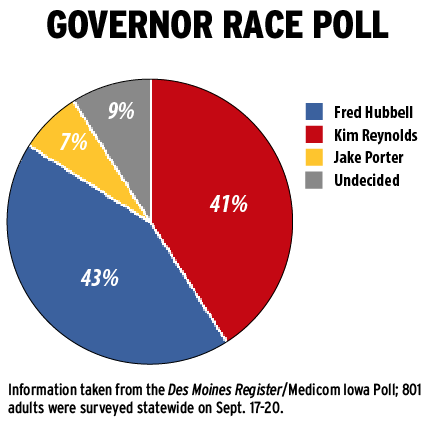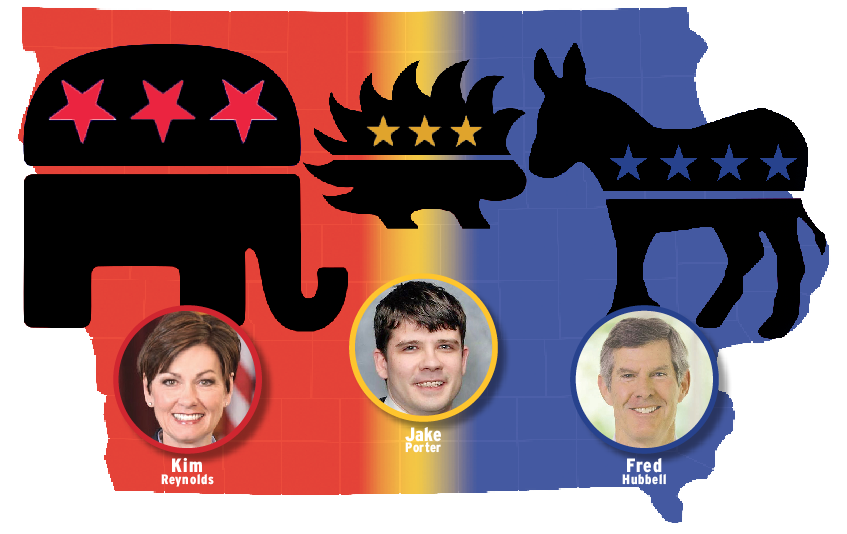Without media attention, Libertarians might lose status as official political party
After securing ballot-eligible status in Iowa following the 2016 elections, Libertarian Party candidates will try to remain a viable political party.
As three debates between Iowa’s gubernatorial candidates fell into place this month, members of the Libertarian Party fear their candidate’s absence could derail a quest to renew their recently acquired status as an official political party in Iowa.
The first of three gubernatorial debates will occur on Oct. 10 between incumbent Gov. Kim Reynolds (R) and Democratic challenger Fred Hubbell in Des Moines. Libertarian candidate Jake Porter will not be included in this debate nor in the following two.
The second debate will be broadcast from Sioux City on Oct. 17, and the third debate will take place on Oct. 21 in Davenport.
Porter’s exclusion from the debates is keenly felt throughout the Libertarian Party, with candidates, members, and supporters across the state feeling frustrated as the campaign clock ticks toward the midterm elections.
Porter said his biggest concern was earning enough votes in November to remain a state political party, a status that he believes could become precarious if voters are not exposed to Libertarian candidates and their platforms.
“That is a big media opportunity to be in the debates; it gives a lot of credibility,” Porter said. “Obviously, if we’re shut out of that, we’re probably not going to get a lot of coverage from that debate, and [we’re] not going to be able to share our views with a lot of Iowans.”
This is the first election cycle since the Libertarian Party gained ballot-eligible status in 2016, following Gary Johnson’s presidential campaign. Iowa law states that to be considered a political party, an organization must have had a gubernatorial or presidential candidate who received at least 2 percent of votes cast in the preceding general election.
The last time a third party became viable as a major party was in 2000, when Green Party candidate Ralph Nader garnered 2.2 percent of the vote.
While this status gives the Libertarian Party the same legal standing as the Democratic and Republican Parties, the most recent Iowa Secretary of State voter-registration totals show there are 11,483 registered Libertarians statewide — fewer than 1 percent of the state’s “active voters.”
Since September 2017, that number has grown by roughly 2,000 voters. Iowa’s numbers align with upward trends nationwide, said Andy Craig, a staff writer for the Cato Institute, a libertarian public-policy research organization based in Washington.
No-party registrants make up the largest group of voters in Iowa over Democrats, Republicans, and other affiliations. This means that come Election Day, this bloc of Iowa voters has a lot of sway over who ends up in office.
Matthew Lindberg-Work, a Libertarian candidate for Jefferson County supervisor, said ensuring these and other voters are informed about all of their ballot choices is critical to promoting the Libertarian ideal that the populace has viable political options beyond those presented by the two-party system.
“The problem is, I don’t understand how the media can decide who gets in the polls and who gets in the debates,” said Mark Strauss, the Libertarian candidate for Iowa’s 2nd Congressional District, which covers 24 counties in the southeastern portion of the state and includes Davenport and Iowa City. “We’re major-party status. If we have a candidate, we should be in the debates. There should be no question about that. Not giving the opportunity to be in debates … is just plain crooked politics.”
The first debate will be cosponsored by KCCI, a Des Moines television station, and the Des Moines Register. In a letter from Brian Sather, the president and general manager of KCCI, to Porter, he cited a variety of criteria as the reason behind the bipartisan debate schedule. At the time of this article’s publication, the full list has not been released, to either the public or Porter’s campaign.
When KCCI News Director Dave Busiek was asked by the DI to elaborate on the decision, he answered that this was to be the only response from the station. Register Executive Editor Carol Hunter said the same.
Porter said he was expecting treatment of this kind from his opponents rather than members of the press, as this is the first speed bump his campaign has faced regarding media inclusion.
The Register Editorial Board interviewed and endorsed Porter against his opponent, Marco Battaglia, in the Libertarian primary. He was also invited to the Register’s upcoming candidate forum focusing on mental health and substance abuse.
“Things have been a lot better since we got that major-party status,” Porter said. “There’s always a few issues, some stations that don’t want to cover anyone else besides the Democrats and the Republicans, but that’s largely gone away.”
Many other Libertarian candidates have sided with Porter in regard to the debates, reflecting on their own efforts to garner attention in the media, often saying past opportunities for exposure have been rare and that new ones have been slower to come than would be preferred.
Among the candidates is Bryan Jack Holder, the Libertarian candidate for Iowa’s 3rd Congressional District, which covers 16 counties in the southwest portion of the state and includes Des Moines. Holder has been included for the first time in a debate alongside his Republican and Democratic opponents. The debate will be hosted by KMA, a radio station serving Shenandoah, Iowa, on Oct. 7.
“It’s taken four years and three times running for Congress to be invited to a debate with the Republicans and the Democrats, so I think we’re making some progress, but I don’t think candidates should have to wait to participate in a debate [if] they were qualified,” Holder said.
In order for the Libertarian Party to maintain ballot-eligible status in Iowa for the next two years, Porter must win 2 percent or more of the total votes cast for governor during the midterm election.
David Cork, member of the Linn County of Iowa Libertarians, said a large reason that gaining votes is an uphill battle for the party is the controversial perception that a third-party vote is essentially worthless.
“From my perspective, if you buy into that lie, you’re actually compromising your voice; you’re compromising your vote,” Cork said. “What you should be doing as a voter — and it doesn’t matter what party you’re in — you should research all of the viable candidates, and you should vote for the candidate who most closely aligns with your personal beliefs.”
Libertarian candidates and supporters contend that the amount of research the average Iowan could do on a candidate is potentially being limited by Porter’s exclusion from the three gubernatorial debates. Joseph Howe, the state chair of the Libertarian Party of Iowa, said Porter’s absence from the debates could make the Libertarians’ position as a ballot-eligible party more precarious by limiting total audience exposure to candidates.
If turnout for Porter fails to meet the required 2 percent threshold, then Libertarians will be relegated back to minor- or non-party status, as the Iowa Green Party was after a lackluster performance in 2002.
“That has a negative impact on how our local parties feel. It adds to their frustration,” Howe said. “But what we’re trying to do is take that frustration and not just turn it into people griping to their friends or on social media but getting people to act and have action based on that. You’re not seeing us be quiet.”

There is a peaceful protest being organized for debate night at KCCI by Porter and others to draw attention to what they perceive to be unfair and damaging practices on the part of the sponsors. Simultaneously, a volunteer viewing list is being circulated among supporters to collect advertising data on KCCI. Libertarians are also taking to various social-media platforms to express their distaste for the exclusion.
“We’ll make noise about it,” Porter said. “Unfortunately, there’s not too much we can do to get into the debates. They have the right to run their debates as they see fit, but we have the right to protest that as well.”
After working toward ballot-eligible status for decades, Libertarians are not going to give it up easily, said Jay Schiesl, the chair for the Dubuque County Libertarian Party. He said he noticed a new air of excitement among members to continue growing the party.
Howe and others hope to gain more members, specifically by expanding the outreach of their current 29-county party affiliates and by building Libertarian chapters in the other 70 counties that do not house one.
“I think that’s what’s going to make us more successful down the road, that’ll help our top ticket as far as our presidential races, our governor races, and our congressional races,” Howe said. “With that [affiliate network], we’re going to be able to build an army of activists that give us the ability to run a ground game, which we’re not able to do at the moment.”



